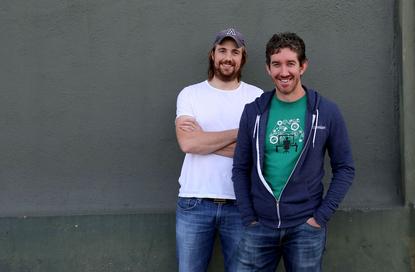457 crackdown dangerous for tech industry: Atlassian
- 29 November, 2016 10:46

Atlassian founders Mike Cannon-Brookes and Scott Farquhar
Moves to tighten Australia's temporary skilled migration program puts the local tech industry in a “very dangerous situation”, says Atlassian co-founder Mike Cannon-Brookes.
Speaking on RN Breakfast this morning, Cannon-Brookes criticised both sides of politics for recent calls to put more rules and restrictions on the issuing of 457 visas.
“I think there’s a danger they throw everything out with the bathwater, to score political points for sure,” he said. “None of them are talking statistics and facts about what’s act happening in 457s.”
Earlier this month, federal Immigration Minister Peter Dutton indicated the government was looking to cut the number of skilled occupations eligible under the 457 visa system, after announcing a reduction in the number of days visa holders can remain in the country after their job ends.
On Monday, Labor proposed a raft of changes to the 457 system in a private bill, including a requirement that employers prove they have contributed to local employment when applying to sponsor workers. One Nation leader Pauline Hanson, meanwhile, said the whole system was a “scam”.
“This suddenly, throw your hands up, ‘all these people are coming in’...The sense that there’s some exploding programme of worker exploitation just isn’t supported by any facts or statistics,” Cannon-Brookes told Fran Kelly.
There are currently around 95,000 people in Australia on a 457 visa, a number which includes their family members. In the last financial year, the Government gave 45,400 visas to foreign workers, a decrease of 11 per cent from the year before.
The number of visas granted has actually been decreasing year on year since 2013.
Success dependant on 457s
Around a quarter of Atlassian’s 1,000 Australia-based staff is currently on 457 visas, a necessity given the lack of senior skilled technology talent in the country, Cannon-Brookes said.
“The success of our Australian operation is quite dependent on these visas,” he said. “We just don’t have [senior, skilled locals]. It’s not a question of not looking or saving money or anything, it’s quite the opposite – it’s far more expensive.
“We don’t have a big tech industry here, we certainly didn’t have one ten years ago. So if we’re looking for someone with ten years’ experience, they largely don’t exist in Australia in the quantity the industry needs them. So we err on the side of importing that talent in order to train the young grads and other people that we have here.”
The idea that the technology industry was exploiting the visa system to obtain cheap labour from overseas was a “crazy argument” Cannon-Brookes said, citing the additional costs of relocating worker’s families and hazard pay.
Short-term solution
Questioned why Australian workers couldn’t be trained to do the jobs foreign workers were filling, Cannon-Brookes argued that it took time, and was not a solution in the short-term.
“The company and the industry are as desperate to train the future of the country as we can be. We can’t train it in the next six, 12, 24 months though, that’s going to take ten years,” he said.
“We just have a shortage that this is the only way to fill. Training’s a long term solution that we have to be investing in for the country, but short term, if we don’t have 457s we won’t have an industry for those trained people to go to.”
Earlier this month, federal Industry Minister Greg Hunt conceded that the IT industry was unique in its dependence on 457 visa holders, suggesting that many technical roles could not be filled locally.
“Well, our approach is really simple. And that is, these are visas for areas that need the actual work. In the IT sector, there is no question,” Hunt told ABC Radio.
“I've met with business leaders, with managers this week and they've said, where there are gaps in Australia, if we can bring people in, they not only provide the employment which allows us to run our businesses here, but they train Australian workers and help them to be part of a globally competitive local business. So, of course there's a place for the international flow of workers.”

